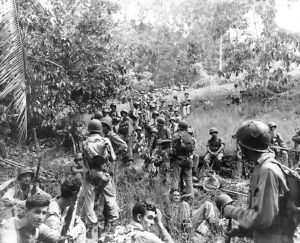Good morning, Whitewater.
Sunday in town will be mostly cloudy with a high of eighty. Sunrise is 5:54 AM and sunset 8:06 PM, for 14h 12m 42s of daytime. The moon is a waxing crescent with 20.6% of its visible disk illuminated.
NASA recently used a new camera, capable of recording with ‘high speed, high dynamic range footage in multiple exposures simultaneously’ to analyze more thoroughly the rocket engines the agency is testing. The footage, beyond being useful to engineers, is striking:
In 2012 FW Summer Olympics poll, about the London games, showed less respondent interest: 24.14% said that they’d watch every day or night, 18.97% said that they;d watch about half the time, 27.59% said that they’d watch sporadically, and 29.31% said that they weren’t interested.
On this day in 1942, the Guadalcanal Campaign begins:
On 7 August 1942, Allied forces, predominantly United States (US) Marines, landed on the islands of Guadalcanal, Tulagi, and Florida in the southern Solomon Islands, with the objective of denying their use by the Japanese to threaten Allied supply and communication routes between the US, Australia, and New Zealand. The Allies also intended to use Guadalcanal and Tulagi as bases to support a campaign to eventually capture or neutralize the major Japanese base at Rabaul on New Britain. The Allies overwhelmed the outnumbered Japanese defenders, who had occupied the islands since May 1942, and captured Tulagi and Florida, as well as an airfield (later named Henderson Field) that was under construction on Guadalcanal. Powerful American naval forces supported the landings.
Surprised by the Allied offensive, the Japanese made several attempts between August and November to retake Henderson Field. Three major land battles, seven large naval battles (five nighttime surface actions and two carrier battles), and continual, almost daily, aerial battles culminated in the decisive Naval Battle of Guadalcanal in early November, in which the last Japanese attempt to bombard Henderson Field from the sea and land with enough troops to retake it, was defeated. In December, the Japanese abandoned their efforts to retake Guadalcanal and evacuated their remaining forces by 7 February 1943, in the face of an offensive by the US Army’s XIV Corps.

